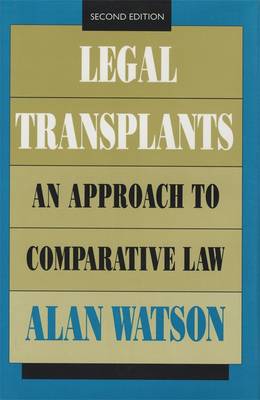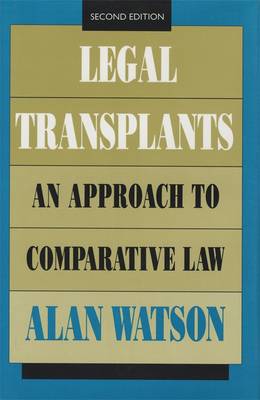
- Afhalen na 1 uur in een winkel met voorraad
- Gratis thuislevering in België vanaf € 30
- Ruim aanbod met 7 miljoen producten
- Afhalen na 1 uur in een winkel met voorraad
- Gratis thuislevering in België vanaf € 30
- Ruim aanbod met 7 miljoen producten
Zoeken
€ 47,45
+ 94 punten
Omschrijving
In Legal Transplants, one of the world's foremost authorities on legal history and comparative law puts forth a clear and concise statement of his controversial thesis on the way that law has developed throughout history.
When it was first published in 1974, Legal Transplants sparked both praise and outrage. Alan Watson's argument challenges the long-prevailing notion that a close connection exists between the law and the society in which it operates. His main thesis is that a society's laws do not usually develop as a logical outgrowth of its own experience. Instead, he contends, the laws of one society are primarily borrowed from other societies; therefore, most law operates in a society very different from the one for which it was originally created. Utilizing a wealth of primary sources, Watson illustrates his argument with examples ranging from the ancient Near East, ancient Rome, early modern Europe, Puritan New England, and modern New Zealand. The resulting picture of the law's surprising longevity and acceptance in foreign conditions carries important implications for legal historians and sociologists. The law cannot be used as a tool to understand society, Watson believes, without a careful consideration of legal transplants. For this edition, Watson has written a new afterword in which he places his original study in the context of more recent scholarship and offers some new reflections on legal borrowings, law, and society.Specificaties
Betrokkenen
- Auteur(s):
- Uitgeverij:
Inhoud
- Aantal bladzijden:
- 144
- Taal:
- Engels
Eigenschappen
- Productcode (EAN):
- 9780820315324
- Verschijningsdatum:
- 1/07/1993
- Uitvoering:
- Hardcover
- Formaat:
- Genaaid
- Afmetingen:
- 145 mm x 218 mm
- Gewicht:
- 340 g

Alleen bij Standaard Boekhandel
+ 94 punten op je klantenkaart van Standaard Boekhandel
Beoordelingen
We publiceren alleen reviews die voldoen aan de voorwaarden voor reviews. Bekijk onze voorwaarden voor reviews.











